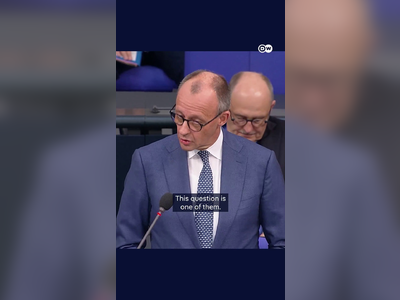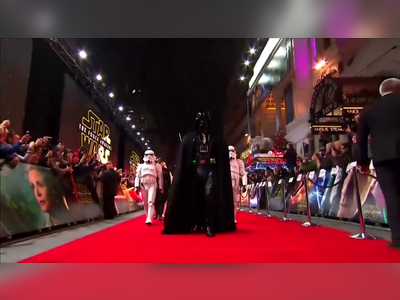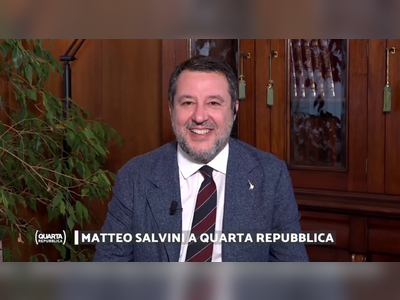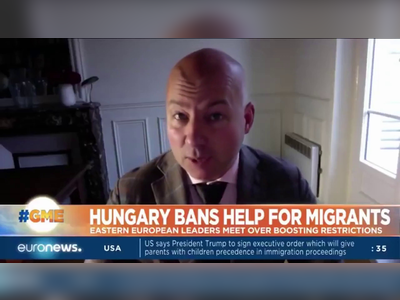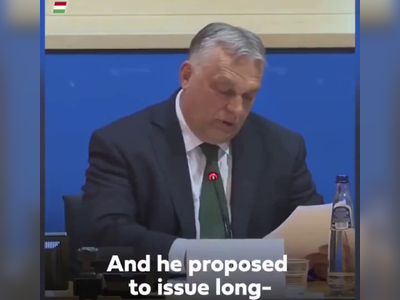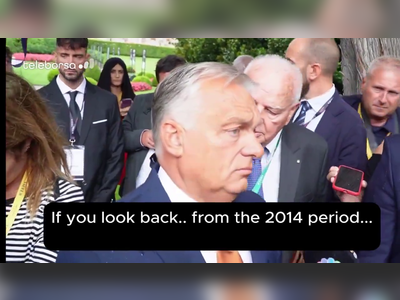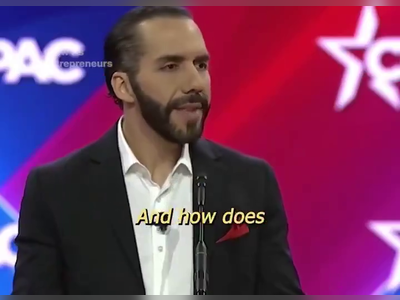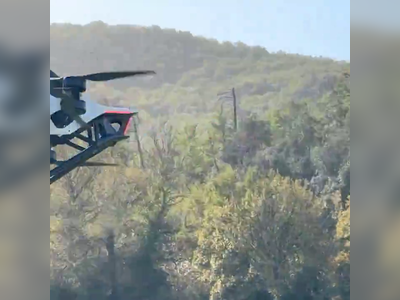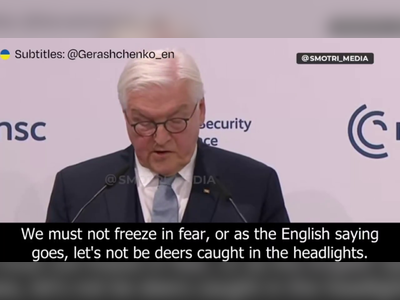Putin Plans to Tax the Oligarchs to Fulfill His Election Promises
During the presidential campaign, Vladimir Putin waved through massive and highly costly social and economic stimulus promises, as showcasing proper legitimacy in the results has become more vital than usual.
Although Russia’s economy, amid the war, might surpass the growth of every G7 nation this year, it remains questionable where he will find the promised $130 billion.
While there is no doubt about who will win the presidential election beginning on March 15 in Russia, it is certain that President Vladimir Putin, preparing for his fifth term, wishes to avoid the fiasco seen in the 2021 parliamentary elections. Despite the usual electoral fraud, the ruling United Russia party could only achieve the targeted majority through conspicuous ballot stuffing. Videos surfaced showing masses of ballots being dumped into boxes by unknown individuals, and there were likely major abuses with the online voting, presumably necessary for the government to retain its constitutional majority.
On August 6, 2023, Dmitry Peskov, a Kremlin spokesperson, was quoted by The New York Times stating, "Our presidential election is not really about democracy, but more about an expensive bureaucracy. Next year, Putin will be re-elected with over 90 percent of the votes." He later clarified that this was his personal opinion and added that he believes the paper "traditionally" misrepresented his words. However, in an interview with the RBK news agency, Peskov reiterated that Russia "in principle" does not need a presidential election, because "it's obvious that Putin will be re-elected."
Although still alive and unimprisoned opposition figures have mostly left the country, those who wished to run for the presidency without the authority's approval were denied candidacy by the Central Electoral Commission. Among the excluded candidates, the most prominent are Boris Nadezhdin, a former member of the Russian parliament, who has faced an intensifying smear campaign since last year and was excluded from candidacy in early February due to his anti-war stance, accusing him of treason against the motherland; and Yekaterina Duncova, a former flag bearer of the anti-war camp, whose candidacy was rejected last year by the electoral commission due to "administrative errors," followed by her arrest on drug possession charges. They also did not permit Igor Girkin, a former FSB officer, who thinks Russia's invasion of Ukraine is too languid and would like to see an escalation of the conflict.
On February 1, 2024, Russia's most famous opposition figure, the now-deceased Alexei Navalny, and his allies called on their supporters to protest against President Putin and the invasion of Ukraine on the third day of the presidential election, urging everyone to vote against Putin. After Navalny's death, Andrius Kubilius, a Lithuanian politician and Member of the European Parliament, Mikhail Khodorkovsky, a former Russian businessman now living in Switzerland, and Navalny's former wife, Yulia Navalnaya, called on the EU to declare the Russian elections illegitimate.
THE NEED FOR FABULOUS PROMISES
It's no wonder, then, that more is at stake in this presidential election than ever before. Putin, who has occupied the position of President or Prime Minister of Russia for 24 years, thus felt the need to buttress his strong legitimacy with grandiose promises. In his speech on February 29, he proposed huge extra state support within a six-year program, including tax breaks for families with children and additional funds for regions with low birth rates, as well as massive infrastructural developments.
With these promises, Bloomberg calculated that the Russian President has overcommitted more than $130 billion. Even the more cautious Reuters speaks of $110 billion in expenditures not previously accounted for in the budget over the next six years.
A similar calculation was made by Dmitry Polevoj, Investment Manager of the Astra Asset Management, who believes these promises will add an extra 2 trillion rubles annually over six years on top of the budget already approved by the legislature in Moscow, which amounts to a total of $130 billion.
It's certain that amidst the war, the Russian President has dangled the prospect of a massive improvement in the standard of living in front of voters.
While Russia's economy has transitioned to wartime operations and Putin himself expects a protracted war he promised to increase maternity benefits and family allowances, and to write off a significant portion of the debt owed by indebted regions to reverse the dramatic population decline. There are plans to develop modern sectors and to accelerate the transition to new technologies, with the goal being that exports should represent more than just raw materials particularly oil for Russia. However, these developments must be made while Russia struggles with a massive labor shortage, exacerbated by the exodus of skilled young people from the warring country.
Demographic issues have been at the forefront for years. At the beginning of February, Putin specifically called on Russian families to have at least two children for the ethnic survival of the nation and at least three or more for the sake of development and growth.
The 71-year-old Putin said that by 2030, at least 75 billion rubles (approximately 4 rubles per forint) would be allocated to regions with below-average birth rates, and he proposed extending the subsidized mortgage and maternity benefit programs until 2030 the latter alone costing 600 billion rubles – before announcing the launch of a new national project called "Family."
According to Putin, poverty is still an acute problem affecting directly 9 percent of the population, with the rate exceeding 30 percent among large families. The goal is to reduce these ratios to below 7 and 12 percent, respectively, by 2030.
COMPREHENSIVE AND VERY COSTLY INFRASTRUCTURAL DEVELOPMENTS
Putin outlined comprehensive plans for the renovation of Russia's infrastructure over the next six years, promising funds to improve the country's economic performance.
The most expensive is the promise to modernize the state infrastructure to the tune of 4.5 trillion rubles, as well as the allocation of 1 trillion rubles for the construction, repair, and equipping of hospitals.
An additional 700 billion rubles was pledged for the creation of digital platforms in key economic sectors, 400 billion rubles were promised for the renovation of schools and kindergartens, 360 billion rubles were earmarked for parks and public spaces, and 250 billion rubles for the modernization of airport infrastructure.
The economy of Russia, with its vast natural resources, experienced a sharp recovery last year after a downturn in 2022, but the growth is largely dependent on state-financed arms and ammunition production necessary for the war in Ukraine, concealing problems that hinder the improvement of Russians' living standards.
After a 1.2 percent decline in 2022, the Russian economy grew by 3.6 percent last year and is expected to surpass the growth of all G7 countries this year. Moreover, according to _Reuters_, it has diversified: non-oil and gas budget revenues increased by 25 percent in 2023. It's no surprise that Putin strongly praises the Russian economy's resilience against sanctions.
CRITICAL LABOR SHORTAGE
According to Putin, based on purchasing power parity (PPP), Russia's economy will soon be among the four largest in the world, but addressing the lack of skilled labor and advanced technologies is vital for Moscow to achieve its economic goals.
The International Monetary Fund ranks Russia sixth based on the purchasing power parity value of GDP, behind China, the United States, India, Japan, and Germany.
Putin believes that the pace and quality of Russia's growth will allow it to join the ranks of the world's four largest economic powers in the near future. To achieve this, he says that the country must create globally competitive products, especially in the fields of space exploration and nuclear energy, and prominent budget resources will be allocated for this purpose. However, the IMF's February report states that the Russian war economy faces tough times due to emigration and a lack of technology. Although unemployment is at a record low of 2.9 percent, there is a significant shortage of labor force.
The Ministry of Finance, already under great pressure due to the surging demand for military spending, must find budgetary resources to fulfill Putin's election promises as well.
HOW WILL PUTIN PAY FOR HIS $130 BILLION ELECTION PROMISES?
Dmitry Polevoj, investment manager at Astra Asset Management, says, "This does not seem insurmountable, although if the economic situation turns out worse than the official forecast, then additional resources will need to be found" – he emphasized.
Of course, the credibility of these numbers is questionable. In Moscow, statistics have always been the handmaiden of politics, but since the attack on Ukraine, this has become even more evident: the regime has put statistics at the service of propaganda. The war economy is secret yet absolutely prioritized, given the immense demand for arms and ammunition. Russia has been forced to import munitions from North Korea, which are chronically short on the Ukrainian front.
The magnitude of the problem is well illustrated by the fact that ever since the war began, the central budget has become deficit-ridden, even though the surplus was previously guaranteed by oil and gas exports.
Although Moscow, in cooperation with Saudi Arabia, is doing everything possible to keep oil prices high: at the latest OPEC+ meeting, they decided to limit production to prevent prices from falling in the global market. Nevertheless, Moscow expects a budget deficit of 1.6 trillion rubles this year and this does not even include Putin's election promises.
So, how does Putin intend to cover all this? By taxing the oligarchs at least, that is what Putin himself suggests. Russian oligarchs have already paid dearly for the war as their dollar millions placed in the West have been seized, arguing that Putin can continue the war in Ukraine with their support.
While there is no doubt about who will win the presidential election beginning on March 15 in Russia, it is certain that President Vladimir Putin, preparing for his fifth term, wishes to avoid the fiasco seen in the 2021 parliamentary elections. Despite the usual electoral fraud, the ruling United Russia party could only achieve the targeted majority through conspicuous ballot stuffing. Videos surfaced showing masses of ballots being dumped into boxes by unknown individuals, and there were likely major abuses with the online voting, presumably necessary for the government to retain its constitutional majority.
On August 6, 2023, Dmitry Peskov, a Kremlin spokesperson, was quoted by The New York Times stating, "Our presidential election is not really about democracy, but more about an expensive bureaucracy. Next year, Putin will be re-elected with over 90 percent of the votes." He later clarified that this was his personal opinion and added that he believes the paper "traditionally" misrepresented his words. However, in an interview with the RBK news agency, Peskov reiterated that Russia "in principle" does not need a presidential election, because "it's obvious that Putin will be re-elected."
Although still alive and unimprisoned opposition figures have mostly left the country, those who wished to run for the presidency without the authority's approval were denied candidacy by the Central Electoral Commission. Among the excluded candidates, the most prominent are Boris Nadezhdin, a former member of the Russian parliament, who has faced an intensifying smear campaign since last year and was excluded from candidacy in early February due to his anti-war stance, accusing him of treason against the motherland; and Yekaterina Duncova, a former flag bearer of the anti-war camp, whose candidacy was rejected last year by the electoral commission due to "administrative errors," followed by her arrest on drug possession charges. They also did not permit Igor Girkin, a former FSB officer, who thinks Russia's invasion of Ukraine is too languid and would like to see an escalation of the conflict.
On February 1, 2024, Russia's most famous opposition figure, the now-deceased Alexei Navalny, and his allies called on their supporters to protest against President Putin and the invasion of Ukraine on the third day of the presidential election, urging everyone to vote against Putin. After Navalny's death, Andrius Kubilius, a Lithuanian politician and Member of the European Parliament, Mikhail Khodorkovsky, a former Russian businessman now living in Switzerland, and Navalny's former wife, Yulia Navalnaya, called on the EU to declare the Russian elections illegitimate.
THE NEED FOR FABULOUS PROMISES
It's no wonder, then, that more is at stake in this presidential election than ever before. Putin, who has occupied the position of President or Prime Minister of Russia for 24 years, thus felt the need to buttress his strong legitimacy with grandiose promises. In his speech on February 29, he proposed huge extra state support within a six-year program, including tax breaks for families with children and additional funds for regions with low birth rates, as well as massive infrastructural developments.
With these promises, Bloomberg calculated that the Russian President has overcommitted more than $130 billion. Even the more cautious Reuters speaks of $110 billion in expenditures not previously accounted for in the budget over the next six years.
A similar calculation was made by Dmitry Polevoj, Investment Manager of the Astra Asset Management, who believes these promises will add an extra 2 trillion rubles annually over six years on top of the budget already approved by the legislature in Moscow, which amounts to a total of $130 billion.
It's certain that amidst the war, the Russian President has dangled the prospect of a massive improvement in the standard of living in front of voters.
While Russia's economy has transitioned to wartime operations and Putin himself expects a protracted war he promised to increase maternity benefits and family allowances, and to write off a significant portion of the debt owed by indebted regions to reverse the dramatic population decline. There are plans to develop modern sectors and to accelerate the transition to new technologies, with the goal being that exports should represent more than just raw materials particularly oil for Russia. However, these developments must be made while Russia struggles with a massive labor shortage, exacerbated by the exodus of skilled young people from the warring country.
Demographic issues have been at the forefront for years. At the beginning of February, Putin specifically called on Russian families to have at least two children for the ethnic survival of the nation and at least three or more for the sake of development and growth.
The 71-year-old Putin said that by 2030, at least 75 billion rubles (approximately 4 rubles per forint) would be allocated to regions with below-average birth rates, and he proposed extending the subsidized mortgage and maternity benefit programs until 2030 the latter alone costing 600 billion rubles – before announcing the launch of a new national project called "Family."
According to Putin, poverty is still an acute problem affecting directly 9 percent of the population, with the rate exceeding 30 percent among large families. The goal is to reduce these ratios to below 7 and 12 percent, respectively, by 2030.
COMPREHENSIVE AND VERY COSTLY INFRASTRUCTURAL DEVELOPMENTS
Putin outlined comprehensive plans for the renovation of Russia's infrastructure over the next six years, promising funds to improve the country's economic performance.
The most expensive is the promise to modernize the state infrastructure to the tune of 4.5 trillion rubles, as well as the allocation of 1 trillion rubles for the construction, repair, and equipping of hospitals.
An additional 700 billion rubles was pledged for the creation of digital platforms in key economic sectors, 400 billion rubles were promised for the renovation of schools and kindergartens, 360 billion rubles were earmarked for parks and public spaces, and 250 billion rubles for the modernization of airport infrastructure.
The economy of Russia, with its vast natural resources, experienced a sharp recovery last year after a downturn in 2022, but the growth is largely dependent on state-financed arms and ammunition production necessary for the war in Ukraine, concealing problems that hinder the improvement of Russians' living standards.
After a 1.2 percent decline in 2022, the Russian economy grew by 3.6 percent last year and is expected to surpass the growth of all G7 countries this year. Moreover, according to _Reuters_, it has diversified: non-oil and gas budget revenues increased by 25 percent in 2023. It's no surprise that Putin strongly praises the Russian economy's resilience against sanctions.
CRITICAL LABOR SHORTAGE
According to Putin, based on purchasing power parity (PPP), Russia's economy will soon be among the four largest in the world, but addressing the lack of skilled labor and advanced technologies is vital for Moscow to achieve its economic goals.
The International Monetary Fund ranks Russia sixth based on the purchasing power parity value of GDP, behind China, the United States, India, Japan, and Germany.
Putin believes that the pace and quality of Russia's growth will allow it to join the ranks of the world's four largest economic powers in the near future. To achieve this, he says that the country must create globally competitive products, especially in the fields of space exploration and nuclear energy, and prominent budget resources will be allocated for this purpose. However, the IMF's February report states that the Russian war economy faces tough times due to emigration and a lack of technology. Although unemployment is at a record low of 2.9 percent, there is a significant shortage of labor force.
The Ministry of Finance, already under great pressure due to the surging demand for military spending, must find budgetary resources to fulfill Putin's election promises as well.
HOW WILL PUTIN PAY FOR HIS $130 BILLION ELECTION PROMISES?
Dmitry Polevoj, investment manager at Astra Asset Management, says, "This does not seem insurmountable, although if the economic situation turns out worse than the official forecast, then additional resources will need to be found" – he emphasized.
Of course, the credibility of these numbers is questionable. In Moscow, statistics have always been the handmaiden of politics, but since the attack on Ukraine, this has become even more evident: the regime has put statistics at the service of propaganda. The war economy is secret yet absolutely prioritized, given the immense demand for arms and ammunition. Russia has been forced to import munitions from North Korea, which are chronically short on the Ukrainian front.
The magnitude of the problem is well illustrated by the fact that ever since the war began, the central budget has become deficit-ridden, even though the surplus was previously guaranteed by oil and gas exports.
Although Moscow, in cooperation with Saudi Arabia, is doing everything possible to keep oil prices high: at the latest OPEC+ meeting, they decided to limit production to prevent prices from falling in the global market. Nevertheless, Moscow expects a budget deficit of 1.6 trillion rubles this year and this does not even include Putin's election promises.
So, how does Putin intend to cover all this? By taxing the oligarchs at least, that is what Putin himself suggests. Russian oligarchs have already paid dearly for the war as their dollar millions placed in the West have been seized, arguing that Putin can continue the war in Ukraine with their support.
AI Disclaimer: An advanced artificial intelligence (AI) system generated the content of this page on its own. This innovative technology conducts extensive research from a variety of reliable sources, performs rigorous fact-checking and verification, cleans up and balances biased or manipulated content, and presents a minimal factual summary that is just enough yet essential for you to function as an informed and educated citizen. Please keep in mind, however, that this system is an evolving technology, and as a result, the article may contain accidental inaccuracies or errors. We urge you to help us improve our site by reporting any inaccuracies you find using the "Contact Us" link at the bottom of this page. Your helpful feedback helps us improve our system and deliver more precise content. When you find an article of interest here, please look for the full and extensive coverage of this topic in traditional news sources, as they are written by professional journalists that we try to support, not replace. We appreciate your understanding and assistance.








